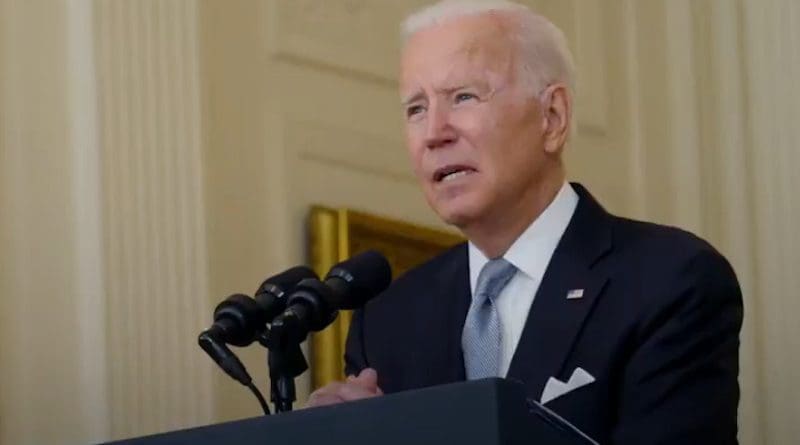Biden Defends End To US War In Afghanistan
By VOA
U.S. President Joe Biden again defended his decision to end the country’s two-decade war in Afghanistan, saying, “I was not going to extend this forever war and I was not going to extend a forever exit.”
“Last night in the United States ended 20 years of war in Afghanistan,” Biden said from the White House, adding that it was America’s longest war.
Speaking about the evacuation of Americans and Afghans after the Taliban retook power in the country, Biden said, “We completed one of the biggest airlifts in history with more than 120,000 people evacuated to safety. … No nation has ever done anything like it,” he added.
For weeks, Biden and other members of his administration discussed the possibility of staying longer, balancing the challenges and benefits of a massive operation to evacuate more U.S. citizens and Afghan civilians against credible security threats.
“It was the unanimous recommendation of the Joint Chiefs and of all of our commanders on the ground to end our airlift mission as planned,” Biden said earlier. “Their view was that ending our military mission was the best way to protect the lives of our troops and secure the prospects of civilian departures for those who want to leave Afghanistan in the weeks and months ahead.”
“The Taliban has made commitments on safe passage, and the world will hold them to their commitments,” he added.
Biden’s decision to stick to the withdrawal deadline drew criticism from political opponents and from some allies. The U.S. exit comes days before the 20th anniversary of the September 11, 2001, terror attacks that prompted the United States to send troops into Afghanistan to go after the al-Qaida terrorists who planned the attacks and the Taliban militants who harbored them.
The head of U.S. Central Command announced the end of the U.S. mission to Afghanistan during a news conference Monday at the Pentagon, telling reporters the last U.S. aircraft took off in Kabul just before midnight local time.
“It’s a mission that brought Osama bin Laden to justice, along with many of his al-Qaida co-conspirators,” General Kenneth (Frank) McKenzie said via a video link from CENTCOM headquarters in Florida. He noted that the cost to the United States was high.
“Two thousand-four hundred-sixty-one U.S. service members and civilians killed, and more than 20,000 who were injured,” he said, praising the hundreds of thousands of troops and civilians who fought and worked in Afghanistan.
“We did not get everybody out that we wanted to get out,” he told reporters, referring to the 18-day effort described as the largest airlift in U.S. military history.
Taliban social media accounts also began posting video of fighters at the airport in Kabul, firing guns into the air in celebration as word spread that the last U.S. troops had left.
According to CENTCOM, the last American civilians to leave Afghanistan boarded flights from Kabul about 12 hours before the final flights took off, although officials held out hope more might be able to make it until the very last moment.
“The military phase of this operation is ended. The diplomatic sequel to that will now begin,” CENTCOM’s McKenzie said, calling the desire to evacuate more U.S. citizens and Afghan allies “as intense as it was before.”
But there will be significant challenges.
The United States no longer has a diplomatic presence in Kabul, and Ross Wilson, the chief U.S. diplomat in Afghanistan, was on the last U.S. flight out.
State Department officials, however, said they will continue to provide consular services to those who want to leave Afghanistan after Tuesday.
Secretary of State Antony Blinken on Monday also left open the possibility that the embassy could eventually reopen in Kabul, depending on how the Taliban conduct themselves, as well as the overall security situation.
The Taliban have asked countries, including the United States, to retain diplomatic missions while assuring their safety and protection.
But the U.S. and its international partners will be looking at the “deeds, not words” of the Taliban when it comes to questions on future diplomatic presence and recognition, according to the State Department.

